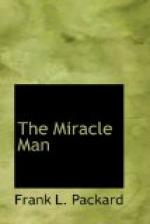Madison began to experience a strange, exhilarating sense of uplift upon him, a sort of rather commendatory and gratified feeling with himself. Marvin had hit it pretty nearly right with his “clean-wholesomeness” idea—it kind of made one feel good to be a part of it. Madison, for the time being, relegated Helena and his immediate mission to a secondary place in his thoughts.
Young girls, young men, middle-aged men, elderly women, all ages of both sexes he passed as he went along; some alone, some in couples, some in little groups, some on crutches, some in wheel-chairs, some walking without extraneous aid—he had turned into the woods now, and he could see them strewn out all along the wagon track under the cool, interlacing branches overhead.
Now he stepped aside to let a wagon pass him, and answered the farmer’s call and the smile of the occupants in kind; now some one stopped to tell him again the story of the afternoon—there had been cures that day and the Patriarch had come amongst them. Some laughed, some sang a little, softly, to themselves—all smiled—all spoke in glad, hopeful words, clean words—there seemed no base thought in any mind, only that cleanness, that wholesomeness that had so appealed to Marvin—that somehow Madison found he was taking a delight in responding to, and, because it afforded him whimsical pleasure, chose to pretend that he was quite a genuine exponent of it himself.
He reached the end of the wagon track, and paused involuntarily on the edge of the Patriarch’s lawn as he came out from the trees. Like low, lulling music came the distant, mellowed noise of waters, the breaking surf. And the cottage was a bower of green now, clothed in ivy and vine—upon the trellises the early roses were budding—fragrance of growing things blended with the salt, invigorating breeze from the ocean. And upon the lawn, flanked with its sturdy maples, all in leaf, that toned the sunshine in soft-falling shadows, stood, or sat, or reclined on cots, the supplicants who still tarried though the Patriarch had gone. And now one came reverently out of the cottage door from that room that was never closed; now another went in—and still another.
Madison smiled suddenly, broadly, with immense satisfaction and contentment—and then his eyes fixed quite as suddenly on the single-seated buggy that was coming toward him on the driveway across the lawn. That was Mamie Rodgers driving—and that was Helena beside her.
Madison recalled instantly the object of his visit—and instantly he whistled a rather surprised little whistle under his breath. How alluringly Helena’s brown hair coiled in wavy wealth upon her head; there wasn’t any need of rouge for color in the oval face; the dark eyes were soft and deep and glorious; and she sat there in a little white muslin frock as dainty as a medallion from a master’s brush.
“Say,” said Madison to himself, “say, I never quite got it before. Say, she’s—she’s lovely—and that’s my Helena. It’s no wonder Thornton stared at her that day we touched him for the fifty, and”—suddenly—“damn Thornton!”




